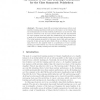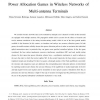76 search results - page 6 / 16 » Some Small Cancellation Properties of Random Groups |
FCT
2009
Springer
14 years 2 months ago
2009
Springer
Suppose that we are given a set of n elements d of which are “defective”. A group test can check for any subset, called a pool, whether it contains a defective. It is well know...
INFOCOM
2003
IEEE
14 years 22 days ago
2003
IEEE
— Considerable attention has been focused on the properties of graphs derived from Internet measurements. Router-level topologies collected via traceroute-like methods have led s...
ALT
2005
Springer
14 years 4 months ago
2005
Springer
This paper deals with an unusual phenomenon where most machine learning algorithms yield good performance on the training set but systematically worse than random performance on th...
CHES
1999
Springer
13 years 11 months ago
1999
Springer
The strength of a cryptographic function depends on the amount of entropy in the cryptovariables that are used as keys. Using a large key length with a strong algorithm is false co...
CORR
2010
Springer
13 years 7 months ago
2010
Springer
We consider wireless networks that can be modeled by multiple access channels in which all the terminals are equipped with multiple antennas. The propagation model used to account...


